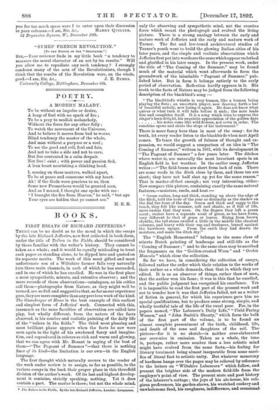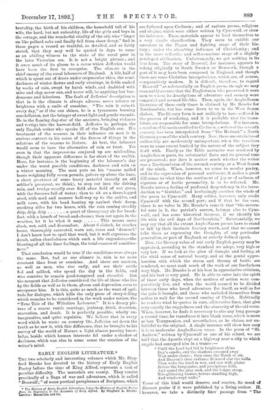BOOKS.
FIRST ESSAYS OF RICHARD JEFFERIES.*
THERE can be no doubt as to the mood in which the essays by the late Richard Jefferies, now first collected in book-form, under the title of Toilers in the Fields, should be considered by those familiar with the writer's history. They cannot be taken as a whole ; and it would be equally misleading to treat each paper as standing alone, to be dipped into and quoted on its separate merits. The work of this most gifted and most unfortunate son of a Wiltshire farmer falls very naturally into three main channels, in each of which he has succeeded, and in one of which he has excelled. He was in the first place a most sympathetic, minute, and retentive observer ; and the mere records of these observations—catalogues, as his critics call them—photographs from Nature, as they might well be termed, are so full and suggestive that, so far as our experience goes, they are more complete than anyprevions work of the kind. The Gamekeeper at Home is the best example of this earliest and simplest form of Jefferies' work. Connected with this, inasmuch as the same faculties of observation are called into play, but wholly different, from the nature of the facts observed, is his sombre and realistic painting of the daily life of the " toilers in the fields." The third most pleasing and most brilliant phase appears when the facts he saw were seen again in the light of his awakened fancy and imagina- tion, and reproduced in colours so rich and warm and glowing, that we can agree with Mr. Besant in saying of the best of them—" The Pageant of Summer "—that there is nothing finer of its kind—the limitation is our own—in the English language.
The first thought which naturally occurs to the reader of the work under review is to assign, so far as possible, to the various essays in the book their proper place in this threefold division of the author's work. Of its last and highest develop- ment it contains, strictly speaking, nothing. Yet it does contain a part. The matter is there; but not the whole mind,
• The Toilers in the Fields. By the late Richard Jefferies. London: Longman%
only the observing and sympathetic mind, not the creative force which recast the photograph and evolved the living picture. There is a strong analogy between the early and mature work of Jefferies and the early and mature work of Turner. The flat and low-toned architectural studies of Turner's youth went to build the glowing Italian cities of his later years, and the simple and realistic observations which Jefferies first put into words are the same which appear reclothed and glorified in his later essays. In the present work, under the title of " The Coming of the Summer," may be found' much of the material which went afterwards to form the groundwork of the inimitable " Pageant of Summer," pub- lished later. But in form it belongs entirely to the early period of observation. Reflection hardly appears in it. His truth to the facts of Nature may be judged from the following description of the blackbird's song :- " The blackbird's whistle is very human, like a human being playing the flute ; an uncertain player, now drawing forth a bar of beautiful melody, now losing it again. He does not know what quiver or what turn it will take before it ends ; the note leads him and completes itself. It is a song which tries to express the singer's keen delight, his exquisite appreciation of the golden days his notes come like wild flowers, not sown in order. The sunshine opens and shuts the stops of his instrument."
There is more fancy here than in most of the essay : for its truth, let every reader listen to the blackbirds when next April- comes. To trace the growth of fulness of thought and ex- pression, we would suggest a comparison of an idea in " The Coming of Summer," written in 1881, with its development in "The Pageant of Summer" a few years later. The ditches where water is, are naturally the most luxuriant spots in an English field in hot weather. In the earlier essay, Jefferies writes :—" The field-beans are short from lack of rain. There are some reeds in the ditch close by them, and these too are short; they have not half shot up yet for the same reason." That is matter-of-fact enough ; not very interesting, either. Now compare this picture, containing exactly the same natural features,—moisture, reeds, and heat :- "Green rushes, long and thick, standing up above the edge of the ditch, told the hour of the year as distinctly as the shadow on the dial the hour of the day. Green and thick and sappy to the touch, they felt like summer, soft and elastic, as if full of life, mere rushes that they were. On the fingers they left a green scent; rushes have a separate scent of green, so too have ferns,. very different to that of grass or leaves. Rising .from brown sheaths, the tall stems swelled a little in the middle like classical columns, and heavy with their sap and freshness, leaned against the hawthorn sprays. From • the earth they had drawn its- moisture, and made the ditch dry."
The " English Homestead" belongs to the same class of minute Dutch painting of landscape and still-life as the " Coming of Summer ; " and to the same class may be ascribed the fragments on the " Golden-crested Wren " and " Orchis Mascula" which close the collection.
So far we have, in considering the collection of essays,.
followed rather the order which their relation to the works of their author as a whole demands, than that in which they are edited. It is as an observer of things, rather than of men, that the author won his fame ; it was in this that he excelled, and the public judgment has recognised his excellence. Yet it is impossible to read the first part of the present work and
not to wonder how it was that Jefferies failed, not as a writer of fiction in general, for which his experience gave him na special qualifications, but to produce some strong, simple, and wholly truthful tale of the life of the rural poor. For, in the- papers named, " The Labourer's Daily Life," " Field-Faring Women," and "John Smith's Shanty," which form the bulk
of the first part of the volume, is to be found an almost complete presentment of the birth, childhood, life, and death of the sons and daughters of the soil. The picture—for it is no sketch—is neither over-elaborated' nor over-nice in omission. Taken as a whole, the tone is, perhaps, rather more sombre than a less artistic mind might have evolved from the same facts,—his feeling for literary treatment being almost inseparable from some sacri- fice of literal fact to artistic unity. But whatever monotony of hardness hangs over the pages may be relieved by reference to the letters on " Wiltshire Labourers " which follow, a,nd present the brighter side of the modern field-life from the employer's point of view. The present state and past history of the labourer's cottage ; the joys of his ale-house, his reli-
gious preferences, his garden-shows, his wretched cookery and unwholesome food, his roughness, indifference, and occasional
brutality, the birth of his children, the household toil of his wife, the hard, but not unhealthy, life of the girls and boys in the cottage, and the wonderful vitality of the old, who " linger on like pollard oaks and finally fall from sheer decay," find in these pages a record so truthful, so detailed. and so fairly stated, that they may well be quoted in days to come as an abiding witness to the state of the rural poor in the later Victorian era. It is not a bright picture ; and it owes much of its gloom to a cause which Jefferies would have been the first to recognise. The climate is the chief enemy of the rural labourers of England. A life, half of which is spent out of doors under crepuscular skies, the semi- darkness of winter dawns and early evenings, in fields soaked by weeks of rain, swept by harsh winds, and drabbled with mire and clay, never can, and never will, be anything but bur- densome and laborious. The fault of Jefferies' description is that in it the climate is always adverse, never relaxes or brightens with a smile of sunshine. "The rain it raineth every day," or if the sun shines, he is a tyrannous burning constellation, not the bringer of sweet light and gentle warmth. He is the flaming dog-star of the ancients, bringing sickness and vertigo into the harvest-field. Jefferies is, perhaps, the only English writer who speaks ill of the English sun. His treatment of the seasons in their influence on man is in curious contrast to his sense of the fitness of things in the relations of the seasons to Nature. At best, the labourer would seem to have the alternative of rain or frost. Yet even in that the impressions conjured up are misleading, though their apparent difference is far short of the reality. Here, for instance, is the beginning of the labourer's day under the worst possible conditions, darkness and rain on a winter morning. The man puts on his "coarse nailed boots weighing fully seven pounds, gaiters up above the knee, a short greatcoat of some heavy material (usually an old soldier's greatcoat, we think), to step out into the driving rain, and trudge wearily over field after field of wet grass, with the furrows full of water; then to sit on a three-legged stool, with mud and manure half-way up to the ankles, and milk cows, with his head leaning up against their damp, smoking sides for two hours, with the rain coming steadily
drip, drip, drip a quart of threepenny ale for break- fast, with a hunch of bread-and-cheese ; then out again in the
weather, let it be what it may This means more slush, wet, cold, and discomfort. About 6 o'clock, he reaches home, thoroughly saturated, worn out, cross and dummel.' I don't know how to spell that word, but it well expresses the dumb, sullen churlishness which such a life engenders,—the blunting of all the finer feelings, the total erasure of sensitive- ness."
That conclusion would be true if the conditions were always the same. But, bad as our climate is, rain is no more constant than frost or sunshine. And there are masters, as well as men, who rise early, and see their cattle fed and milked, who spend the day in the fields, and who contrive to remain good-tempered and cheerful. But the moment that Jefferies considered the life of those who live by the fields as well as in them, gloom and depression seem to overpower him. It is this, quite as much as the want of apti- tude for dialogue, which kills the only piece of story-telling which remains to be considered in the work under review, the "True Tale of the Wiltshire Labourer." It is a dreary pic- ture of a coarse rustic marriage, jealousy, drink, desertion, starvation, and death. It is perfectly possible, wholly un- imaginative, and quite repulsive. We believe that in every word which he wrote on country life. Jefferies set down the truth as he saw it, with this difference, that he brought to his survey of the world of Nature a light almost passing know- ledge, beside which human interests fel under a shadow of darkness, which was also in some sense the creation of the writer's mind.







































 Previous page
Previous page